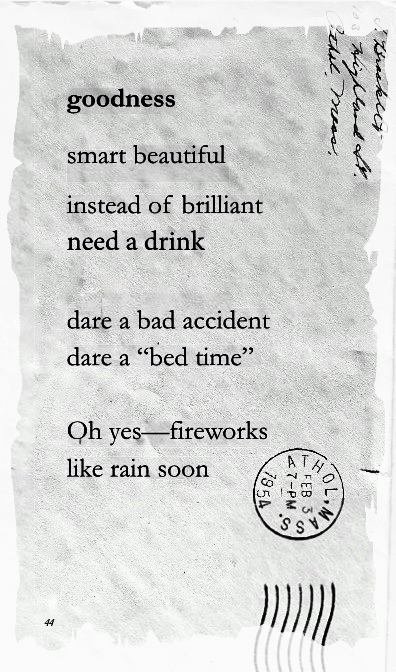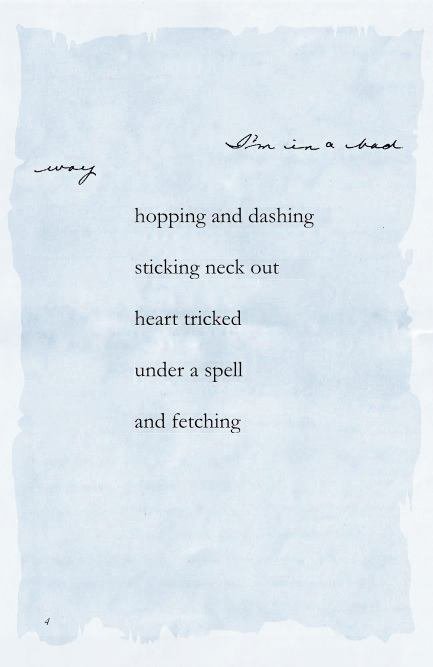ART & HYBRIDS
Kelly DuMar: Excerpts from jinx and heavenly calling
Artist Statement:
storm, goodness, and in a bad way are excerpts from a collection of epistolary erasure poems I crafted from the pages of the handwritten letters from my mother. It was a gift I had no expectation of receiving––this box of surprise that came into my hands a few years ago. A lost treasure I had no idea existed in the world. Inside: All the letters, handwritten, that my mother had sent to my father during their courtship, from 1953-1954, starting with their first date, and ending soon after they married. She was working as a records librarian at a hospital and living with her parents in Athol, MA. My father was living in Cambridge, Massachusetts while attending the Harvard Business School.
Some of the letters were loose––many of them still had their envelopes with canceled stamps. Awestruck by this gold mine, I immediately began reading them. I did my best to put them in order by date or by weather suggesting a season, or a mention of a holiday. Touching the stiff paper she wrote on––moving my fingers over ink from her pen––was a delicious experience.
My mother had lovely hand writing, and I easily recognized it as belonging to her and her alone. But who was she? This young woman falling in love with the man who would become my father, who wrote, playfully, “You’re just too much for me, I guess,” after spending a weekend with him in Cambridge.
My mother was not alive anymore at the time that the letters came into my hands. The letters were my way of having her alive again, at an age I never knew her, speaking directly in her own voice. Then why did you erase the words? you might ask. As a daughter, and an artist, I was compelled, instinctively, to challenge the text of the letters––because I knew how the story ends, after a fifty-year marriage.
Borrowing ideas on form from erasure poets, I established these rules for creating this collection: One letter per poem. Many of the letters consist of multiple pages. Sometimes I selected only from the first page or the second page, or from all pages. However, I could only select words working forward through the letter, never backward. So, the selected words and punctuation appear in the order made in the original letter. I followed the original use of capitalization. Original spelling is preserved. Punctuation was selected in the same way as the words. The palimpsest, or background, on which each poem is set, is made from the original letter or its envelope. In revision, I aimed to shape the poem around what the poet David Schaafsma calls “finding nuggets of beauty in something surprising.”
I have poached the letter writer’s original words, taken them out of context, and created my own imaginary context. The poems are what I plucked and shaped as my eye scanned down the page spontaneously selecting words and phrases––by instinct, by hunger, by intuition, by mischief, by choice, by whimsy––to create what Mary Ruefle calls “a poetic experience.”
jinx and heavenly calling––I poached a portion of my mother’s love letters to my father, 1953-1954 by Kelly DuMar is now available for purchase from all booksellers.
Editor’s Note: Please use the scrollbars to view the full gallery from Kelly DuMar.
Kelly DuMar is a poet, playwright and workshop facilitator from Boston. She’s author of four poetry collections, including jinx and heavenly calling, published by Lily Poetry Review Books in March 2023. Her poems are published in Bellevue Literary Review, Tupelo Quarterly, Thrush, Glassworks, Flock and more. Kelly teaches a variety of creative writing workshops, in person and online, and she teaches Play Labs for the International Women’s Writing Guild and the Transformative Language Arts Network. Kelly produces the Featured Open Mic for the Journal of Expressive Writing. Reach her at kellydumar.com



